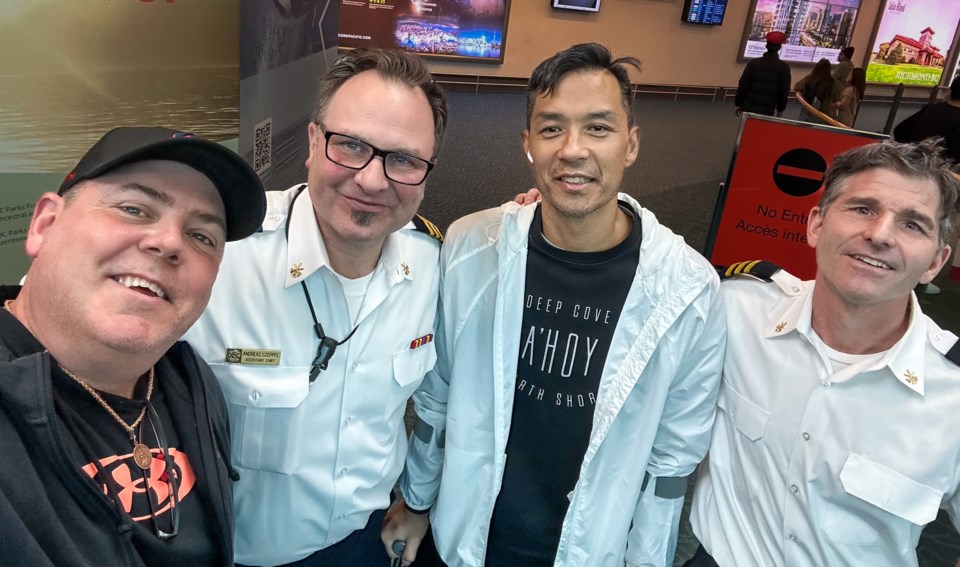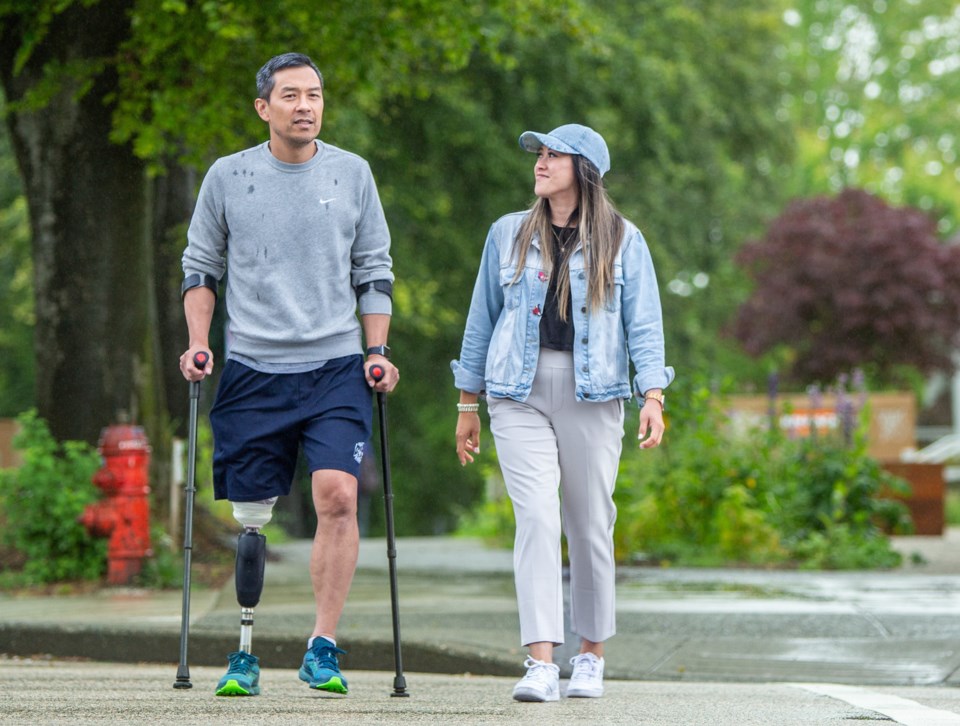The tall, athletic 53-year-old man using a set of crutches to make his way up a sidewalk in his Hastings-Sunrise neighbourhood has a story to tell.
It’s one Christopher Won never imagined telling.
The short version: He takes a family vacation to Asia in February, wakes up one morning with a sore foot, the pain becomes unbearable, he checks in to a hospital in Hong Kong, is diagnosed with necrotizing fasciitis, loses his lower right leg to amputation.
The longer version of Won’s story is still being written as he continues to grapple with the reality of a life-changing event, and how what he described as an injury continues to test him physically and mentally each day.
“I say to everyone who asks that there's good days and bad days, just like in anyone's life,” he said, sitting at a café with his wife Marie Hui at his side.
He pointed to his right leg and a recently added prosthesis before continuing his thought.
“My bad days are based on this,” he said.
He then gestured over to a random person sitting in the café.
“That person over there is maybe having a bad day based on something completely different,” he said. “That's just how our emotions work. You have your good days and your bad days. But I won't lie to you, the bad days are bad, but the good days are good.”
Won, an assistant fire chief with Â鶹´«Ã½Ó³»Fire Rescue Services, spent 31 days in hospital in Hong Kong before returning home March 18.
Since then, he has worked towards getting rid of his crutches, as he tries out a variety of prostheses — an experience he likened to test driving a car.
“We're not anywhere close to being with a permanent leg,” he said, noting his current prosthesis weighs nine pounds.
“My leg is going to change in size and shape as we work on walking and wearing it longer and longer. Currently, I can wear it for two hours at a time and then have to take it off.”
Former high school teacher
Awkward and clumsy is how he described the feeling of wearing the prosthesis, which requires him to rely heavily on his hip to move the artificial device; the amputation was above the knee.
Won’s goal is to be fitted with a lighter and thinner carbon fibre prosthesis that allows him to “get back to normal independent living.”
What that looks like is a work in progress.
“The short-term goals are just to be able to be confident with the prosthesis, so something as simple as walking up and down a set of stairs without crutches,” he said, adding that he wants to drive again, too.
Fitness has always been important to Won, who taught physical education and English at a Richmond high school before pursuing a career 21 years ago as a firefighter. He has a martial arts background, once rode his bike across Canada, has run a marathon and enjoys snowboarding.
When he left for Asia with his wife and two young children, the six-foot-one Won weighed a healthy 196 pounds. When he returned, he stepped on a scale at the G.F. Strong Rehabilitation Centre in Â鶹´«Ã½Ó³»to learn he had lost 30 pounds.
He is slowly putting on weight, has returned to his community gym and has a team at G.F. Strong assisting him in his journey.
That is the physical side of his rehabilitation.
How has he coped mentally?
Initially, he said, he was regularly seeing a counsellor.
Then he got to a place where he felt better mentally and emotionally. He referenced the relationship between an athlete and personal trainer to explain his reason for taking a break from the sessions.
“At some point, you reach a certain level of fitness or you reach a certain level of confidence where you can do some things on your own,” he said.
“If something comes up, I'll call that person up — just like if I get an injury, I'll call that trainer, and he'll work me through my injury until I get back to where I need to be.”

'We operate as one unit'
All that said, Won is clear that he would not have progressed this far without the support and love of his wife, Marie, a professional singer who is often called upon to sing the national anthem before Â鶹´«Ã½Ó³»Canucks and Whitecaps games.
It was Marie who had to give doctors in Hong Kong the approval to amputate her husband's leg; Won learned he lost his leg via a written note from Marie, who was unable to speak directly to him because he was intubated and heavily medicated.
“That whole scenario of telling him was awful,” said Marie, noting she wasn’t familiar with necrotizing fasciitis until she Googled it. “The first thing that came up was flesh-eating disease. That was something I didn’t want to see. It was like something out of a movie.”
The strong bond between the couple was evident in the café, as each shared details on how their life has changed, and how they are pushing ahead together. Noticeable during the interview was the many times Won used “we” instead of “I” when discussing his rehabilitation.
“We operate as one unit, and everything we do is communicated and synchronized between the two of us,” he explained. “Even though it's my physical injury and my mental trauma and my emotional things that I have to deal with, she's dealing with it as well, and I know it affects her.”
Added Won: “I couldn't have done any of this, or survived any of this without her.”
'It was surreal'
Marie was the person who broke the news to her husband’s colleagues at the fire department, who suspected something had gone sideways on Won’s vacation when he posted a cryptic note to a firefighters’ Facebook group about overseas medical coverage.
Mike Canaday, a training officer at the department who has known Won for at least 20 years, said the post was unusual for his friend, who he described as a private person and not one to use social media.
Then he and colleagues Andreas Czeppel and Justin Mulcahy heard from Marie that Won was in rough shape in hospital. He was about to undergo what turned out to be an initial unsuccessful surgery to remove bacteria spreading in his leg.
“It was surreal — kind of like, ‘Is this really happening sort of thing,” Canaday said.
Czeppel and Mulcahy were equally shocked by the news, with Czeppel saying how helpless he felt being a world away from his good friend.
“That's the nature of our work — we're here to serve and we like to fix things,” said Czeppel, the assistant chief of emergency communications. “If you're broken, we'll try and fix you. We'll help you. And we couldn't do that.”

'Outcome was entirely uncertain'
Mulcahy was at a national Heavy Urban Search and Rescue conference in Ottawa when he received a message from Marie. Subsequent messages made it clear how serious the disease was, and what it was doing to his friend.
“It kind of became clear that his outcome was entirely uncertain, meaning Marie wasn't sure whether he would make it or not,” said Mulcahy, an assistant chief of operations support. “So that is when it solidified in my mind about how dire the circumstances he was in.”
The trio created a WhatsApp group chat with Marie for updates.
Mulcahy said it was “a tough balance” to keep the information about Won among a few people in the department, noting how their friend was a private person.
At the same time, he added, the department has a pool of up to 900 people “who will do pretty much anything for someone that needs something.”
Some were set to board a plane and visit Won at the hospital.
In the days after Won’s surgery, when he was able to talk, Canaday and Czeppel stayed connected with him by phone. Each of them called Won in Hong Kong at the end or beginning of their shifts at the department.
“I didn't really want to push too hard [about what happened], I just kind of let him talk about whatever he wanted,” Canaday said. “But he wouldn't even talk about himself. He would always ask, ‘How are you doing and what's going on with you?’’
Canaday was familiar with necrotizing fasciitis, noting his brother contracted the disease in his arm seven years ago. In that case, amputation wasn’t required.
Motivational speech
In the past few months, Canaday and Won have become very close. Or as he put it, “more intimate than a normal guy relationship.” He continues to be impressed by his friend’s resiliency, sharing a story about Won’s recent visit to the department’s training centre.
Canaday said he delivered an impromptu speech to new recruits that was “Rudy-like,” a reference to the 1993 inspirational movie about a young man who harbours dreams about playing football for the University of Notre Dame.
“He came in with his crutches, stood there and gave a motivational speech that was, well… people were literally shaking their heads and going, ‘How's this guy doing this right now?’” he said.
Czeppel recalled the day in March that he and his colleagues picked up Won at the Â鶹´«Ã½Ó³»airport. He said Won looked tired, “having gone through hell.” Fast forward to this month and Czeppel likes what he sees.
They met recently for lunch.
“When we walked out of the restaurant, I was walking next to my buddy, and I'm looking at him and I'm smiling,” he said. “And he's looking at me like, ‘What are you smiling at?’ And I just gave him a big hug.”
'Kids tell it like it is'
The support from his colleagues has been multiplied by other firefighters, who have prepared meals for Won and his family, visited him at home and mowed his lawn. He’s been offered rides to appointments, too.
Fire Chief Karen Fry has told him that she will do anything he needs in terms of support, including contacting the head person of the department’s health insurance provider; Won's hospital bills in Hong Kong were covered by his travel insurance.
“She’s been super,” Won said. “I don't think we really took her up on too many of those kind of situations, but it is nice to hear the absolute top person in our organization saying she was connected through the city and has this network at her level that I may not have access to.”
Mayor Ken Sim also stopped by the house to offer help.
Through it all, Won’s five-year-old son and three-year-old daughter have been processing the attention and what happened to their father.
“I think they’re too young to realize how serious it was, but they're old enough and smart enough to understand there's something drastically different,” Won said.
“Kids tell like it is. There's no filter. They'll say, ‘Remember when you had two legs and you used to do this? Or, now that you've got a cut leg — they refer to it as my cut leg — you can't do that anymore.’”
Won and his wife have shared books with their children about people with various body types. One of the books is called “Bodies are cool,” which was in the home before Won lost his leg.
“Every single person illustrated in this book is very normal looking, or very unique looking, like with a prosthesis or with an eye patch — everybody's body is so drastically different, which is technically what you would see in real life,” Marie said.
“We’ve been reading that book for a long time, so they've been accustomed to this is what bodies kind of look like. So we went back to that book when we came home.”
Contracting flesh-eating disease remains a mystery
Now several months into his rehabilitation, Won is still asked the one question by family, friends, health professionals and reporters that he can’t answer: How do you think you contracted necrotizing fasciitis?
“I don't spend any time now thinking about that because it would drive me insane,” he said.
“But at the time, I tried to think, did I have a cut? Did I get a scratch and step in dirty water? I can't think of a single thing then or now that would have indicated that there was something wrong. But from what we've read, you can also just get a bug bite and you scratch it overnight when you're half asleep. That could easily have caused it, as well.”
Won was only a few months into his new job at the department, where he oversees training and professional development, when he was hospitalized.
In June, he began doing some administrative work from home, and there is discussion about the department modifying one of its cars to allow Won to drive again.
Getting back on the job is important to him, but he knows it’s not his top priority.
“In my preoccupation of getting back to work, I need to remind myself that my real job is to recover and that will get me back to work,” he said. “So regardless of what kind of expectations I have to be present in my job, the reality is my full-time job is to get healthy and back to where I can function as a fire chief.”



